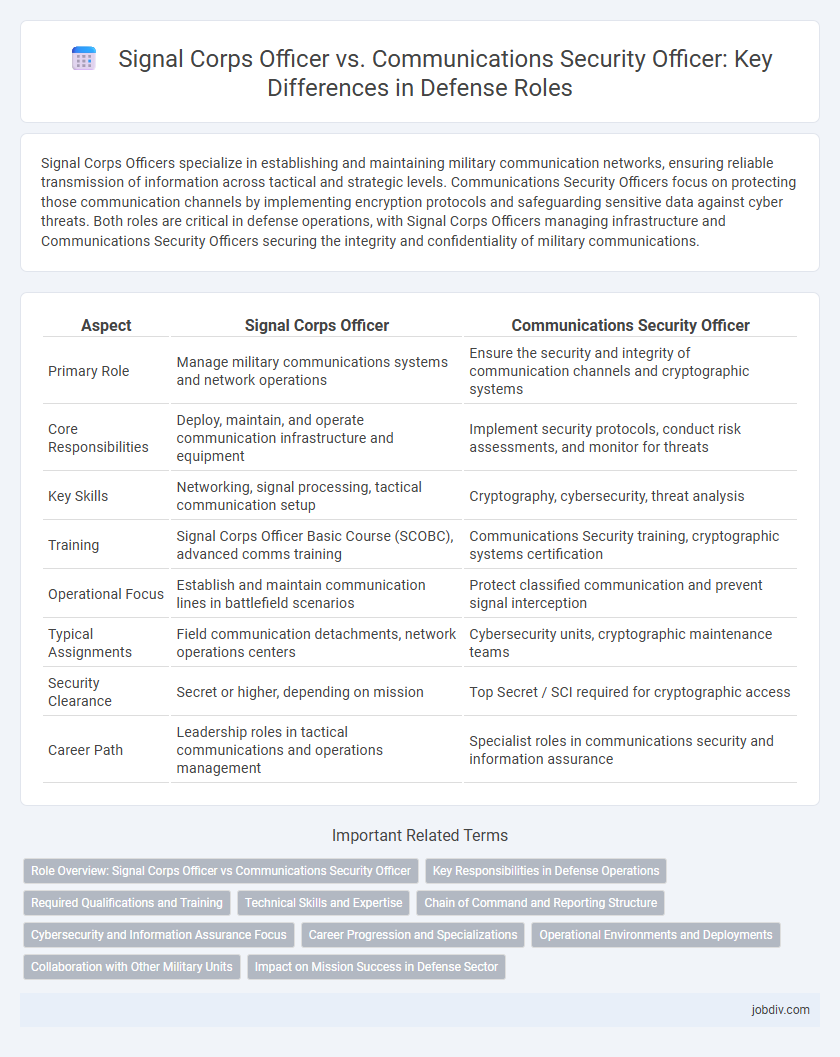Signal Corps Officers specialize in establishing and maintaining military communication networks, ensuring reliable transmission of information across tactical and strategic levels. Communications Security Officers focus on protecting those communication channels by implementing encryption protocols and safeguarding sensitive data against cyber threats. Both roles are critical in defense operations, with Signal Corps Officers managing infrastructure and Communications Security Officers securing the integrity and confidentiality of military communications.
Table of Comparison
| Aspect | Signal Corps Officer | Communications Security Officer |
|---|---|---|
| Primary Role | Manage military communications systems and network operations | Ensure the security and integrity of communication channels and cryptographic systems |
| Core Responsibilities | Deploy, maintain, and operate communication infrastructure and equipment | Implement security protocols, conduct risk assessments, and monitor for threats |
| Key Skills | Networking, signal processing, tactical communication setup | Cryptography, cybersecurity, threat analysis |
| Training | Signal Corps Officer Basic Course (SCOBC), advanced comms training | Communications Security training, cryptographic systems certification |
| Operational Focus | Establish and maintain communication lines in battlefield scenarios | Protect classified communication and prevent signal interception |
| Typical Assignments | Field communication detachments, network operations centers | Cybersecurity units, cryptographic maintenance teams |
| Security Clearance | Secret or higher, depending on mission | Top Secret / SCI required for cryptographic access |
| Career Path | Leadership roles in tactical communications and operations management | Specialist roles in communications security and information assurance |
Role Overview: Signal Corps Officer vs Communications Security Officer
Signal Corps Officers specialize in managing military communications systems, overseeing the installation, operation, and maintenance of tactical communication networks to ensure reliable information flow in diverse combat environments. Communications Security Officers focus on safeguarding these communications by implementing cryptographic measures, monitoring secure channels, and preventing unauthorized access to sensitive data. Both roles are critical for maintaining operational security and effective command and control within defense operations.
Key Responsibilities in Defense Operations
Signal Corps Officers manage the deployment, maintenance, and security of tactical communication systems, ensuring uninterrupted voice, data, and video transmission on the battlefield. Communications Security Officers specialize in implementing cryptographic measures and safeguarding classified information against electronic threats to maintain communication integrity. Both roles are critical for effective command, control, and intelligence sharing in modern defense operations.
Required Qualifications and Training
Signal Corps Officers require a bachelor's degree in engineering, computer science, or related fields, along with completion of the Signal Officer Basic Course, emphasizing communications systems and network management. Communications Security Officers must possess expertise in cryptography, secure communications protocols, and undergo specialized training like the Communications Security Officer Course to manage encryption and information security. Both roles demand strong technical skills, security clearances, and continuous professional development in emerging communication technologies.
Technical Skills and Expertise
Signal Corps Officers specialize in advanced military communication systems, including radio, satellite, and network operations, ensuring robust battlefield connectivity. Communications Security Officers possess expertise in cryptographic protocols, secure transmission techniques, and cyber defense measures to protect sensitive information from electronic warfare threats. Both roles require proficiency in signal processing technologies, but Communications Security Officers focus more on encryption and electronic countermeasures.
Chain of Command and Reporting Structure
Signal Corps Officers manage tactical communication systems and report directly to battalion or brigade commanders, ensuring seamless operational communication flow. Communications Security Officers specialize in cryptographic security and encryption protocols, typically reporting to intelligence or cybersecurity chiefs within the chain of command. Both roles integrate closely with the command hierarchy to maintain secure and efficient communication networks critical to mission success.
Cybersecurity and Information Assurance Focus
Signal Corps Officers specialize in managing military communications networks, emphasizing the deployment and maintenance of secure communication systems critical for tactical operations. Communications Security Officers focus on cybersecurity and information assurance by implementing encryption protocols, safeguarding classified data, and preventing cyber threats within defense communication infrastructures. Both roles collaborate to ensure comprehensive protection of military information systems against cyber attacks and unauthorized access.
Career Progression and Specializations
Signal Corps Officers advance through roles in battlefield communications, network management, and electronic warfare, specializing in tactical signal systems and satellite communications. Communications Security Officers focus on cryptographic protocols, cybersecurity measures, and secure transmission technologies, progressing toward roles in cyber defense and intelligence operations. Career progression for Signal Corps Officers emphasizes operational command and technical expertise, while Communications Security Officers develop deeper specialization in cyber protection and secure information systems.
Operational Environments and Deployments
Signal Corps Officers specialize in establishing and managing battlefield communications infrastructure, ensuring real-time data and voice transmissions across diverse and hostile operational environments including remote, urban, and joint coalition settings. Communications Security Officers focus on protecting sensitive information through cryptographic systems and secure communication protocols, mitigating cyber threats and electronic warfare risks during deployments in both stable and contested areas. Both roles are critical in modern military operations, with Signal Corps Officers enabling connectivity and Communications Security Officers safeguarding operational integrity in dynamic combat zones.
Collaboration with Other Military Units
Signal Corps Officers coordinate closely with infantry, artillery, and aviation units to establish and maintain reliable communication networks vital for battlefield operations. Communications Security Officers collaborate with intelligence and cyber warfare teams to ensure encrypted transmissions safeguard sensitive information during joint missions. Both roles require seamless integration with other military branches to enhance operational effectiveness and maintain secure, real-time communication channels.
Impact on Mission Success in Defense Sector
Signal Corps Officers specialize in establishing and maintaining tactical communication networks, ensuring robust and reliable information flow across units, which directly enhances command and control efficiency. Communications Security Officers focus on safeguarding sensitive communication channels from interception and cyber threats, thereby preserving operational secrecy and preventing intelligence compromise. The combined expertise of both roles is critical for maintaining secure and effective communication, which is essential for mission success and battlefield superiority in the defense sector.
Signal Corps Officer vs Communications Security Officer Infographic

 jobdiv.com
jobdiv.com